Session time: Monday 27 September, 1.30pm AEST
We have assembled a group of senior researchers and upcoming stars in the biofabrication field, ready to discuss a range of themes and topics with participants.
The first 30 minutes will be on “themes” and the second 30 minutes will be on “topics”. Registrants will be grouped into breakout rooms based on the themes/topics they have selected. The session is designed to be interactive where you will get the opportunity to talk to the legends face-to-face.
Registration for this session is required. Please register your interest here https://bit.ly/3tBCc9b.
Legends
- Tim Woodfield, University of Otago (New Zealand)
- Riccardo Levato, University Medical Center Utrecht (The Netherlands)
- James Yoo, Wake Forest Institute for Regenerative Medicine (USA)
- Shrike Zhang, Harvard Medical School (USA)
- Stephanie Willerth, University of Victoria (Canada)
- Mia Woodruff, Queensland University of Technology (Australia)
- Kris Killian, University of New South Wales (Australia)
- Paul Dalton, University of Oregon (USA)
- Jinah Jang, Pohang University of Science and Technology (South Korea)
- Tony Weiss, University of Sydney (Australia)
- Jos Malda, University Medical Center Utrecht (The Netherlands)
Themes
Career planning, Surviving academia, Commercialisation, Work-life balance, Publishing
Topics
Biomaterials/bioinks, Bioprinting technologies, Clinical Translation, In vitro/in vivo studies
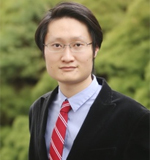
Prof Yu Shrike Zhang
Shrike is currently an Assistant Professor of Medicine at Harvard Medical School and Associate Bioengineer in the Division of Engineering in Medicine at the Brigham and Women’s Hospital. Dr. Zhang’s research is focused on innovating medical engineering technologies, including 3D bioprinting, organs-on-chips, microfluidics, and bioanalysis, to recreate functional tissues and their biomimetic models. In collaboration with a multidisciplinary team encompassing biomedical, mechanical, electrical, and computer engineers as well as biologists and clinicians, his laboratory seeks to ultimately translate these cutting-edge technologies into the clinics. He is an author of >250 peer-reviewed publications and his scientific contributions have been recognized by >40 international, national, and regional awards.
Themes: Career planning, Surviving academia, Work-life balance, Publishing
Topics: Biomaterials/Bioinks, Bioprinting technologies
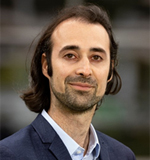
Prof Riccardo Levato
Riccardo is currently Associate Professor of Translational Bioengineering and Biomaterials at the Department of Clinical Sciences (Faculty of Veterinary Medicine, Utrecht University), and a principal investigator both at the Regenerative Medicine Center Utrecht and at the Department of Orthopedics of the University Medical Center Utrecht. His research interests focus on the development of novel biofabrication strategies and cell-instructive biomaterials to create bioprinted, lab-made tissue models and transplantable engineered grafts, particularly for the regeneration of the musculoskeletal system. In 2020 he was awarded a Starting grant from the European Research Council. In addition, since 2021, he is coordinator of a European consortium (ENLIGHT), funded under the Future and Emerging Technologies scheme (European Innovation Council pilot. To date, he has published 49 peer-reviewed articles (H-index=21), co-authored 2 book chapters and 2 patent applications, and he secured > 13 million euros in research funds for his group and related consortia. For his work, he was conferred several awards including a Orthoregeneration Network Fellowship by the International Cartilage Repair Society (ICRS), the Wake Forest Institute for Regenerative Medicine Young Investigator Award, and the Julia Polak doctoral award from the European Society for Biomaterials. Riccardo is an active member of the ESB, TERMIS, ICRS, and he is serving on the Board of Directors of the International Society for Biofabrication.
Themes: Career planning, Surviving academia, Publishing
Topics: Biomaterials/Bioinks, Bioprinting technologies

Prof James Yoo
James is Professor and Associate Director of the Wake Forest Institute for Regenerative Medicine (WFIRM), with a cross-appointment to the Departments of Urology, Physiology and Pharmacology, and the Virginia Tech-Wake Forest School of Biomedical Engineering and Sciences. He is the current President of the International Society for Biofabrication. His research efforts have been directed toward the clinical translation of tissue engineering technologies and cell-based therapies. His background in cell biology and medicine has facilitated the transfer of several cell-based technologies from the bench-top to the bedside. A few notable examples of successful clinical translation include the bladder, urethra, vagina, and muscle cell therapy for incontinence. His has been a lead scientist in the bioprinting program at WFIRM and was instrumental in developing skin bioprinting and integrated tissue and organ printing (ITOP) systems for preclinical and clinical applications.
Themes: Career planning, Surviving academia, Commercialisation
Topics: In vitro/in vivo studies, Clinical Translation
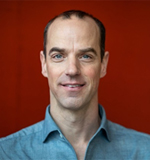
Prof Jos Malda
Professor Jos Malda is Head of Research at the Department of Orthopaedics, University Medical Center Utrecht and the Department of Clinical Sciences, Faculty of Veterinary Medicine, University of Utrecht. He also leads the Utrecht Biofabrication Facility. He received his MSc degree in Bioprocess Engineering (Wageningen University, 1999) and completed his PhD on Cartilage Tissue Engineering in 2003 (University of Twente). He subsequently accepted a research fellowship at the Institute of Health and Biomedical Innovation (Queensland University of Technology, Brisbane, Australia). In 2007, Dr. Malda was awarded a fellowship that allowed him to establish his research group in Utrecht and subsequently received an ERC Consolidator grant. Dr. Malda has published over 175 articles in peer-reviewed international journals, attracted close to 20 million Euro in research funding over the last 7 years. Further, he is one of the initiators of the first international master’s program in Biofabrication. From 2014-2018, he was the president of the International Society for Biofabrication. He is a pioneer in the field of biofabrication and his research aims to promote tissue regeneration by recreating 3D biological environments with the aid of biofabrication technologies. Bioprinted constructs are evaluated in ex vivo defect models and bioreactors to provide tissue maturation and validation as close as possible as that occurring in the in vivo situation. Moreover, promising strategies are translated towards in vivo models with potential impact in human and veterinary medicine.
Themes: Career planning, Surviving academia, Publishing
Topics: Bioprinting technologies, In vitro/in vivo studies

Prof Tony Weiss
Professor Weiss is the McCaughey Chair in Biochemistry, NHMRC Senior Leadership Fellow, and Professor of Biochemistry & Molecular Biotechnology. He leads Tissue Engineering & Regenerative Medicine in the Charles Perkins Centre at the University of Sydney. He has received many awards, is President-Elect of global TERMIS, Fellow of 8 societies, is on 13 Editorial Boards, authored >300 publications, and is inventor on 163 awarded international patents in 21 patent families covering human tropoelastin, which gives tissue its elasticity and enhances the repair of scars and wounds. He founded the clinical stage company Elastagen Pty Ltd which was spun off from the University of Sydney to commercialize tropoelastin. Benefitting from a remarkable executive and board, Elastagen was acquired by Allergan plc, for a total of A$350 million in one of the largest transactions completed in the Australian life science sector.
Themes: Career planning, Surviving academia, Commercialisation
Topics: Biomaterials/Bioinks, In vitro/in vivo studies
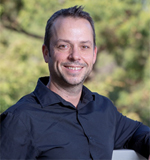
Prof Kris Killian
Kris received B.S. and M.S. degrees in Chemistry from the University of Washington in 1999 and 2003 respectively, and his PhD in Chemistry at the University of New South Wales in 2007. Kris was a NIH postdoctoral fellow at the University of Chicago (2008-2010), Assistant Professor of Materials Science and Engineering (2011-2017) and Associate Professor of Bioengineering and of Medicine (2017-2018) at the University of Illinois at Urbana-Champaign. Kris took on a joint appointment in the School of Chemistry and the School of Materials Science and Engineering at UNSW Sydney in 2018. Kris is a recipient of the Cornforth Medal from the Royal Australian Chemical Institute (2008), the NIH Ruth L. Kirchstein National Research Service Award (2008), a Kavli Fellow of the 19th German-American Frontiers of Science (2014), the National Science Foundation’s CAREER award (2015), a Young Innovator of Cellular and Molecular Bioengineering (2017), recipient of the Australian Research Council Future Fellowship (2018), and the Deans award for Excellence in Research (2020). His research interests include the design and development of model extracellular matrices and dynamic hydrogels for cell engineering, biofabrication, and fundamental studies in cell plasticity.
Themes: Surviving academia, work-life balance, publishing
Topics: Biomaterials/Bioinks, in vitro/in vivo studies

Prof Tim Woodfield
Tim Woodfield is Professor of Regenerative Medicine in the Department of Orthopaedic Surgery at the University of Otago Christchurch. He leads the CReaTE Group and is Director of the University of Otago Centre for Bioengineering & Nanomedicine. His research involves musculoskeletal Regenerative Medicine focussing of cell- and biomaterial-based therapies combined with development of Biofabrication and Additive Manufacturing platforms for repair of cartilage and bone, including: 3D bioassembly platforms, hydrogel/bioink development, 3D models of stem cell niche and high throughput screening. He is a Fellow of Biomaterials Science & Engineering (FBSE) as well as a recipient of a prestigious Rutherford Discovery Fellowship from the Royal Society of New Zealand and the Australasian Society for Biomaterials & Tissue Engineering Research Excellence Award (2020). He has published over 123 peer reviewed journal articles and attracted over NZ$28M in national and international grant funding. He is President Elect of the International Society for Biofabrication (ISBF) and sits on the Tissue Engineering & Regenerative Medicine Intl Society (TERMIS) Council. He is an Editorial Board Member for journals Biofabrication, APL Bioengineering, and Frontiers in Bioengineering & Biotechnology.
Themes: Career planning, Work-life balance, Publishing
Topics: Bioprinting technologies, In vitro/in vivo studies

Prof Stephanie Willerth
Stephanie is a Full Professor in Biomedical Engineering, holds a Canada Research Chair in Biomedical Engineering at the University of Victoria where she has dual appointments in the Department of Mechanical Engineering and the Division of Medical Sciences. She also holds an appointment with the School of Biomedical Engineering at the University of British Columbia. She recently founded the start-up company – Axolotl Biosciences that sells high quality bioinks for bioprinting human tissue models. She is an active member of the steering committee of the B.C. Regenerative Medicine Initiative and the Stem Cell Network. She also serves as a staff scientist at Creative Destruction Lab. She served as the Acting Director of the Centre for Biomedical Research and the Biomedical Engineering undergraduate program at the University of Victoria from 2018-2021 and as the President of Canadian Biomaterials Society from 2018-2019.
Themes: Commercialisation, Work-life balance, Publishing
Topics: Biomaterials/Bioinks, Clinical Translation
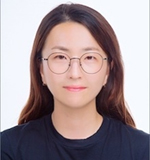
Prof Jinah Jang
Dr. Jinah Jang received her PhD at Pohang University of Science and Technology (POSTECH) in Korea, and trained as postdoctoral fellow in POSTECH and Institute for Stem Cell and Regenerative Medicine at University of Washington. She has joined the POSTECH in 2017 and now an associate professor in the Convergence IT Engineering, Mechanical Engineering, and School of Interdisciplinary Bioscience and Bioengineering. She has published more than 70 peer-reviewed articles in journals including Chemical Reviews, Science Advances, Nature Communications, and Biomaterials. Her h-index and citations (calculated by Google Scholar) are 37 and >5000. She currently serves as an Editorial Board Member of International Journal of Molecular Science, Applied Sciences, and Journal of Korean Society for Precision Engineering and as the Associate Editor of Bio-Design & Manufacturing. She has served as a board member of multiple academic societies including Early Career Researchers Committee of International Society for Biofabrication, and the Korean Society for Precision Engineering. She also has received numerous awards including the ISBF young scientist award (2014), Presidential Postdoc Fellowship from NRF Korea (2015), Excellence Young Researcher Award from Korea Society for Biomaterials (2020) and Korea Tissue Engineering and Regenerative Medicine Society (2021). Her research interest lies in engineering the functional human tissues using high-performance stem cells and printable biomaterials-based 3D bioprinting technology.
Themes: Career planning, Surviving academia, Commercialisation
Topics: Biomaterials/Bioinks, Bioprinting technologies

Prof Mia Woodruff
Professor Mia Woodruff has 21 years’ experience in biomedical engineering since her undergraduate degree and PhD at the University of Nottingham, UK. She is as an internationally renowned expert in tissue engineering and Biofabrication, with extensive experience in all aspects of biomaterial scaffold fabrication techniques, pre-clinical models and histological analysis. Mia has published over 120 peer reviewed journal articles and is the recipient of a QUT Vice Chancellor’s Research Fellowship, ARC Fellowship and established the Biofabrication and Tissue Morphology Group (BTM) in 2010 as one of QUT’s youngest professors. Mia’s exciting vision is of a future where the fabrication of patient-specific replacement tissue and organs is safe, cost-effective and routine and where 3D medical scanning modelling and printing can positively impact healthcare service delivery. In partnership with Metro North Hospital and Health Services, Mia’s Hospital of the Future vision has recently led to the establishment of the Herston Biofabrication Institute. Mia’s team focusses on uses the platform technologies of 3D scanning, modelling and printing, bringing together clinicians, researchers, industry and patients on one site. Mia is also a passionate science- communicator and recognises enormous value in engaging the general public in her work; particularly students.
Themes: Career planning, Surviving academia, Publishing
Topics: Biomaterials/Bioinks, Bioprinting technologies

Prof Paul Dalton
Paul Dalton is an Associate Professor at the University of Oregon who specializes in manufacturing technologies for biomedical applications. As a graduate student in Perth, Australia, he was part of a bioengineering team at the Lions Eye Institute that successfully took an artificial cornea from concept to the clinic. His academic career has an international perspective, living in Canada, Germany, UK, China, Hong Kong and Singapore. He invented and developed melt electrowriting as a distinct class within 3D printing and has over 25 years’ experience across several disciplines. Paul has published over 100 research articles in journals that include Advanced Materials, Progress in Polymer Science and Nature Materials.
Themes: Career planning, Surviving academia, Work-life balance
Topics: Biomaterials/Bioinks, Clinical Translation
